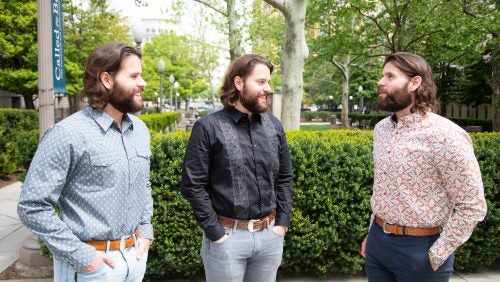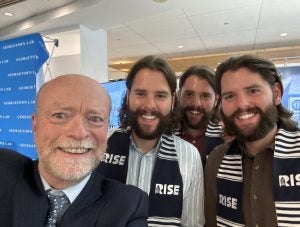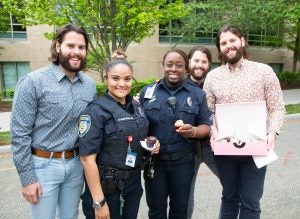Three Brothers, One Purpose: Graduating Identical Triplets Reflect on Finding a Passion for Public Service at Georgetown Law
May 16, 2024

L-R: Benjamin, Nicholas and Zachary Osborne, G’20, L’24.
Identical triplets Nicholas, Zachary and Benjamin Osborne, G'20, L'24, remember how they felt when they first found out they had been admitted to Georgetown Law. "When we got the acceptance letter, it was saying welcome home," Nicholas says. Having moved to Washington, D.C. to earn master's degrees in economics from Georgetown in 2020 and enjoyed their first round as Hoyas, the 29-year-old North Carolina natives say that getting into the Law Center was the sign they needed that the nation’s capital had become home.
Law school graduation is the latest academic milestone for the Osbornes, who will also earn their master of business administration degrees from the George Washington University this Sunday. The brothers also hold bachelor’s degrees in economics and political science from the University of North Carolina at Charlotte.
“Growing up, we three were always interested in policy issues,” says Zachary. “We would carefully wait up at night for economic reports. We would be emotionally affected by, for example, a bad report. Not because of the politics behind it, but because policy choices affect people’s lives.”
The Osbornes didn’t always plan to attend law school. As first-generation college students, the brothers say they grew up with a limited understanding of the legal profession — but their desire to pursue a legal education emerged as their commitment to working on behalf of others came into focus.
“With our Georgetown law degrees, we’ve been able to really discover who we are and what we want to do,” says Nicholas. “What we want to do is to help people.”
While the brothers are still finalizing their post-graduation plans, they hope to find roles in D.C. that allow them to use their legal and business degrees. And though they’ve never been forced to split up for an academic or internship experience thus far, they are open to working separately after graduation.
“It’s been a blessing to have what we’ve had so far,” says Benjamin. “Whatever comes will come, and we’ll accept that.”
Life as triplets
For the trio, juggling J.D. and MBA coursework has required rigorous time management — resulting in days that begin as early as 3 a.m. and a system that Benjamin describes as “organized chaos.” One strategy? Taking the same classes in order to streamline their commute, since the brothers live together in Georgetown and rely on one car to travel across town for classes.

Dean William M. Treanor poses for a selfie with the brothers.
Despite the perks of “triplet telepathy” (it’s real, they confirm), the brothers say they have different strengths: Benjamin excels at art and history, Zachary at English and writing and Nicholas at math and science.
Still, Nicholas notes, their GPAs remain remarkably similar — and always have been. “We usually compete with each other for grades in a class yet always get very similar scores,” he says.
When it comes to joint decision-making, the brothers say that they are often in agreement about their choices, such as attending law school, from the outset. But when disagreements arise, compromise is key — and they eschew a strict majority-rules approach.
“Two-thirds majority is an effective tool, yet it does happen that one-third ends up winning if [one of us] expresses a deep and profound passion for whatever is being considered,” Nicholas says.
There are also areas where the brothers don’t strive for constant collaboration, such as their clothing choices. While they might match for special occasions and tend to prefer similar styles, they say they don’t usually dress alike.
“It doesn’t matter if we wear exactly the same outfit or three distinctly different ones,” Benjamin says. “People still notice that we’re triplets either way.”
Learning in the nation’s capital
At Georgetown, the brothers have taken on a full range of experiential learning opportunities, including two externships, first working as law clerks for the United States Senate Committee on Homeland Security and Government Affairs before interning in the office of U.S. Senator Tim Scott (R-S.C.).

The Osbornes shared cupcakes with campus safety department employees to celebrate their last day of classes.
When not working on Capitol Hill, the brothers have also returned to their home state for clerkships, serving Justice Richard Dietz of the Supreme Court of North Carolina last summer and clerking for the North Carolina General Assembly following their 1L year.
Above all, the brothers say they are grateful to have learned from professors who are also accomplished attorneys.
“They are really masters of the craft, and they are experts in their field,” says Benjamin of the trio’s professors, among them practitioners with experience arguing before the Supreme Court and serving in the highest levels of government. “My favorite thing about Georgetown Law is that we are able to learn from such fantastic professors and build relationships with them.”
Faith, perseverance and identity
Outside of school, the brothers maintain a busy schedule of volunteering through their church, Passion City Church D.C., which they joined last year. That decision, they say, marked a turning point in their lives — and their approach to helping others.
“We had honestly given up hope that our lives would improve,” says Nicholas, who notes that the trio had been struggling to make friends and envision their lives after graduation. “All of that changed when we [joined] … we started doing more things at school, we started committing ourselves to church service and to building relationships.”

The brothers designed custom class rings commemorating Georgetown and the other institutions they’ve attended while each earning five degrees over the past 11 years.
Those relationships include church staff and parishioners that the triplets consider their D.C. family. They’ve also formed lasting connections through volunteering with homeless outreach and helping fellow congregants with cooking, cleaning and other household chores. On campus, they’ve bonded with other members of the RISE program, which serves students who may have had less exposure to the legal profession before law school.
“It’s more life-giving to focus on other people than to focus on yourself,” says Zachary. Their commitment to public service hasn’t gone unnoticed, either. Professor Kristen Konrad Tiscione, L’87, who taught the Osbornes’ first-year legal writing class, recently ran into the trio on campus — and took note of the brothers’ newfound humility and sense of purpose. “When they saw me, they smiled warmly and welcomed me like an old friend,” she says. “I immediately noticed something in our interaction that had not been there before. They explained that their priorities had shifted dramatically; whereas once they focused on their own success, they now focused on helping others.”
Similarly, the Osbornes emphasize that they don’t mind the attention they receive from strangers. Being triplets acts like a built-in icebreaker, they say, allowing them to connect with people they might not otherwise have the chance to meet.
“People say, ‘Wow, I’ve never met triplets before — you’re so special,’” explains Zachary. “We say, ‘Well, there are three of us, but only one of you. So you are way more special than we are, and it’s our pleasure to have met you.’”